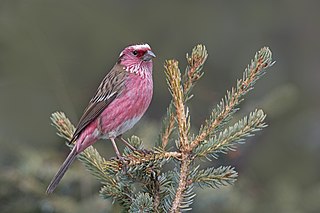
The true finches are small to medium-sized passerine birds in the family Fringillidae. Finches generally have stout conical bills adapted for eating seeds and nuts and often have colourful plumage. They occupy a great range of habitats where they are usually resident and do not migrate. They have a worldwide native distribution except for Australia and the polar regions. The family Fringillidae contains more than two hundred species divided into fifty genera. It includes the canaries, siskins, redpolls, serins, grosbeaks and euphonias, as well as the morphologically divergent Hawaiian honeycreepers.

The rosefinches are a genus, Carpodacus, of passerine birds in the finch family Fringillidae. Most are called "rosefinches" and as the word implies, have various shades of red in their plumage. The common rosefinch is frequently called the "rosefinch". The genus name is from the Ancient Greek terms karpos, "fruit", and dakno, "to bite".

The common rosefinch or scarlet rosefinch is the most widespread and common rosefinch of Asia and Europe.

Cassin's finch is a bird in the finch family, Fringillidae. This species and the other "American rosefinches" are placed in the genus Haemorhous.

The pine grosbeak is a large member of the true finch family, Fringillidae. It is the only species in the genus Pinicola. It is found in coniferous woods across Alaska, the western mountains of the United States, Canada, and in subarctic Fennoscandia and across the Palearctic to Siberia. The species is a frugivore, especially in winter, favoring small fruits, such as rowans. With fruit-crop abundance varying from year to year, pine grosbeak is one of many subarctic-resident bird species that exhibit irruptive behavior. In irruption years, individuals can move long distances in search of suitable food supplies, bringing them farther south and/or downslope than is typical of years with large fruit crops.

The Bonin grosbeak or Bonin Islands grosbeak is an extinct finch. It is one of the diverse bird taxa that are vernacularly called "grosbeaks", but it is not closely related to the grosbeaks sensu stricto. Many authorities place the species in the genus Carpodacus, but some place it in its own genus, Chaunoproctus. A 2013 genetic analysis found it to be a relatively basal member of the group, more derived than the common rosefinch, but with no close relatives, with an estimated divergence time from other members of the group around 12.5 million years ago.

The dark-rumped rosefinch is a species of finch in the family Fringillidae.

The pink-rumped rosefinch is a species of finch in the family Fringillidae.

The Himalayan beautiful rosefinch is a true finch species. It is found in mid-western China and the northern Himalayas. Its natural habitats are temperate shrubland and subtropical or tropical high-altitude shrubland.

The spot-winged rosefinch, also known as the spotted rosefinch, is a species of finch in the family Fringillidae. It is found in India and Nepal. Sharpe's rosefinch was formerly considered conspecific with it. Its natural habitat is subtropical or tropical high-altitude shrubland.

Blanford's rosefinch or the crimson rosefinch, is a species of finch in the family Fringillidae. It is found in Bhutan, China, India, and Nepal. Its natural habitat is boreal forest.

The streaked rosefinch is a true finch species. It is found on the Himalayan Plateau. Its natural habitat is boreal shrubland.

The Himalayan white-browed rosefinch is a true finch species.

The crimson-browed finch is a true finch species. It is found in Bhutan, China, India, Myanmar, and Nepal. Its natural habitats are temperate forests and temperate shrubland.

The Siberian long-tailed rosefinch is a species of finch of the family Fringillidae.

Sharpe's rosefinch is a species of finch in the family Fringillidae. It is found in central China and far northern Myanmar. Its natural habitat is subtropical or tropical high-altitude shrubland. It was formerly considered to be a subspecies of the spot-winged rosefinch.

The Chinese white-browed rosefinch is a true finch species.
The beautiful rosefinch has been split into two species:
















